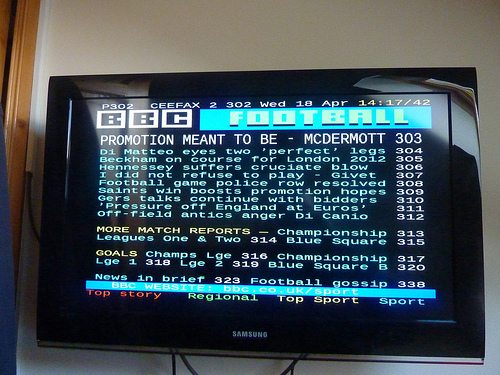Ceefax vs Netflix: Forty Years of TV Innovations
Ceefax – Joshua Murray
In the age of iPhones, Wi-Fi and rolling news channels, we are never more than a few metres away from an immediate source of information. But what preceded these 21st century inventions?
In the same year that this very publication came into being, the BBC began their first test transmissions for the Teletext system Ceefax – a name derived from its proximity to the phrase “see facts”. Don’t worry, I didn’t realise either!
The innovative resource, which officially began running on BBC television a year later, in 1974, suddenly provided TV viewers with a wealth of knowledge at their fingertips, granting access to breaking news and sports stories, weather and travel. For audiences resigned to waiting for the Six O’Clock News as an update on the day’s events, Ceefax’s constant stream of information was a new and exciting introduction to the television experience.
Perhaps the most entertaining aspect of the Teletext system was the adrenaline-fuelled moments of news-browsing it could evoke. I am confident I am not the only person to have spent many an hour sprawled in front of my TV, waiting with bated breath for my team’s football result to appear and then frantically searching for the ‘Hold’ button before it scrolled away and resigned me to a twenty minute wait until it reappeared.
Greater minds than mine were regular users as well, with ex-Prime Minister John Major admitting to regularly checking the cricket scores on Ceefax in between Downing Street meetings.
Sadly for Teletext enthusiasts such as myself, the Ceefax service closed down in October of last year, to coincide with the final digital switchover in Northern Ireland. But whilst it may be gone, it will never be forgotten. You can keep your BBC News channels and Internet TVs – Ceefax will forever remain as one of the true innovations of television history.
Netflix – Sam Steiner
On Sunday September 22nd, 39 years and 49 weeks after The Boar was first distributed across campus, Netflix became the first non-TV network to win an Emmy. In fact, it won three, and was nominated for many more for the delightful House of Cards, starring Kevin Spacey. One of the awards won was none other than the prized Best Director award for David Fincher, surely one of the greatest directors working in modern film.
Netflix, as we all know (students make up a good proportion of their target market) is an online streaming site aimed at “binge watching” whole seasons of multiple shows at once.
The success of Netflix seemed, upon its conception, inevitable. BBC IPlayer, 4OD and all other copycats already made the “unmissable, unmissable.” This is a world in which the only thing worth watching live on an actual television, in the historical 1973 sense, is a sporting event or, if you lack a social life and/or literacy, the Big Brother results show. Why wouldn’t a site that lets you watch both old television and new programmes that star a Texan, camera-winking Kevin Spacey blow all the out-dated competition out of the water?
But to an older audience – perhaps an audience from the year that this paper began – the idea sounds a little strange. Television back then was organised very much around family viewing, around event TV. Alas, Netflix has killed event television, possibly for good.
No longer does a family sit around the TV in pyjamas on Saturdays to watch the latest episode of Happy Days. Netflix has not only changed the screen we watch TV on, it has changed the entire way we think about the medium. A future in which programmed television descends almost completely into quasi-biblical On Demand listings is not unforeseeable.
Will that be the new normality of television?
We’ll get back to you on The Boar’s 80th.

Comments